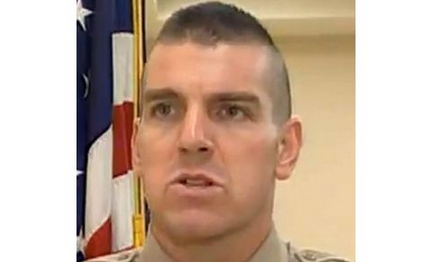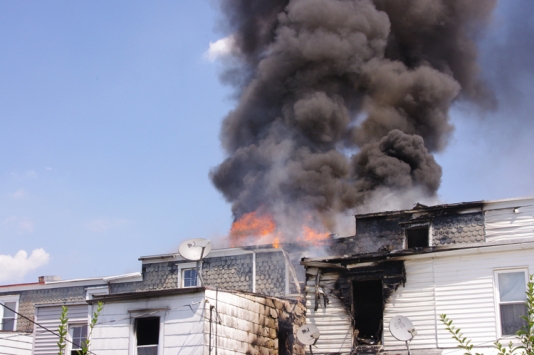Social Media Blindness leads to posting of cop’s death & firefighter’s response rant
Even though their actions weren't intended to hurt, both are receiving death threats

Looking for a quality used fire truck? Selling one? Visit our sponsor Command Fire Apparatus
Store clerk Kashina Harper doesn’t know why she decided to broadcast live on Facebook what turned out to be the final moments of Officer Michael Langsdorf’s life. The North County Police Cooperative officer was shot to death yesterday (Sunday) evening at the Wellston, Missouri food market where Harper works. Harper says she had already used his police radio to call for help and even held the officer’s hand.
Kim Bell, St. Louis Post-Dispatch:
“I’m the one who tried to save that man,” Harper said. “I went to his walkie-talkie. I said, ‘A police is down. Somebody shot him. 6250 Page. Can you please hurry up?’ I was calling for help. I hold his hands.”
Then she stepped back and live-streamed — for more than two minutes — what happened next, showing two women comforting the officer until two police officers arrived.
“C’mon hurry up,” Harper yells on the video. “Oh my god, I’m shaking.”
There’s mounting criticism of Harper and even death threats over her, now removed, Facebook Live post. Firefighter Robert Sarazen says he’s also getting death threats for a live social media post. Sarazen’s was on Snapchat and occurred while he was recently responding to an overturned vehicle in Glades County, Florida. The firefighter’s narration during the video included profanity and what may have been sarcastic complaints about having to go out in the rain for the call. Sarazen has resigned from the fire department.
While I am not comparing the death of a police officer to a routine traffic incident, I believe there’s much in common between the live social media posts of Kashina Harper and Robert Sarazen. Both appear to be the result of something I call Social Media Blindness or SMB. SMB occurs when the urge to share your thoughts or to immediately show everyone what you’re experiencing is so overpowering it makes you blind to things like common sense, ethics and even basic humanity.
Don’t be so quick to judge Harper or Sarazen. My gut is neither is a bad person. In fact, if he didn’t have any prior issues, I don’t think Sarazen should have been forced to part company with his fire department. Both Harper and Sarazen suffered lapses of good judgment thanks to that thing at the end of their arms. Not their hands, but the smartphone. It’s the gateway to stardom, or at least some recognition from others that their lives are special and not just the routine and even boring humdrum of our everyday experiences.
Just think of all the very personal things we now routinely share on social media. Things that a dozen or so years-ago we might only talk about with our closest friends, but would be absolutely horrified to discuss with or show strangers. We now post the intimate details and associated images of our problems finding mates, our difficulties after we dump or get dumped by mates, the rashes on our bodies, the diagnoses from our doctors, the moments before the doctors cut into us and what we look like after they sew us up. For those who are older than 35 or so I have a question. Before smartphones and Facebook would you have ever thought of taking a camera to your hospital stay and then invite the neighbors over to share your operation photos as if you were showing them slides from your family trip to Key West?
In the social media classes I conduct for firefighters I often say we live in a time when many of us feel the need to post something before each trip to the bathroom and then post an after action report when the mission is completed. An exaggeration, yes. But maybe it isn’t, considering we’ve reached a point where a firefighter thinks his priority when responding to an emergency is to immediately get on social media and tell us how he feels, or a citizen’s instinct after calling to get help for a mortally wounded police officer is to show the world the blood and anguish occurring before her eyes.
Again, don’t judge them. They’re not alone. We can all think of things that shouldn’t have been shared shared on social media. Last year, within seconds of a Baltimore light rail train slicing a man in half, people who witnessed it were showing the body halves live. I knew about it because firefighter and police Facebook friends were sharing those awful videos and images and making jokes. How many times have we seen people in public safety sharing smiling selfies at the scene where a home, business or even lives were lost?
None of this is an excuse for the live transmission of the final moments of a police officer’s life. It shouldn’t happen. Period. But as we continue to think it’s okay to share most everything else in our lives that’s short of someone dying, we may be failing to clearly see what we’ve become. Our vision gets blurred and common sense gets foggy by the lure of holding in our hands something that has the potential to be as powerful as the television transmitter or printing press of 20 years ago. And at a time when those who now run the real television transmitters–or cable and streaming platforms–are presenting us the raw views of life on the streets with shows like “Live PD” and “Live Rescue”, are we really surprised the public follows suit with their own mini-versions?
It’s likely all of us using social media have been afflicted with Social Media Blindness. I have. You don’t need to lose your job or get death threats to have an SMB diagnosis. If you’ve ever regretted a hasty post because it was in error or hurt someone, that could be SMB.
The only thing that might save us from an era where we regularly get notifications to watch someone’s demise live on our phone is to pause. To take just a moment before we go live with our inner most thoughts or the drama playing out before us. To use that moment to ask questions about why we’re doing it and even giving some thought to balancing the reason for sharing with an assessment of who might get hurt. I’m not optimistic. It’s hard to visualize ethics, compassion and basic humanity when you know your social media viral moment may be at your fingertips.
NOTE: Kashina Harper’s live post was briefly shared on stltoday.com, the website for the newspaper St. Louis Post-Dispatch. The newspaper said it was bad news judgement and has apologized to the Langsdorf family and readers.






